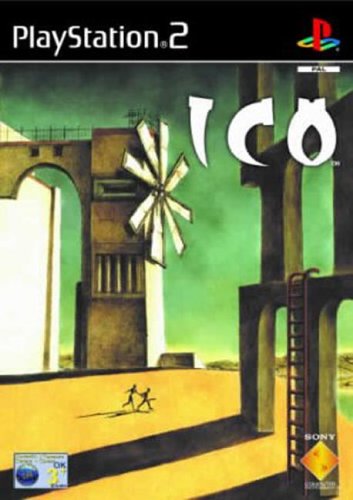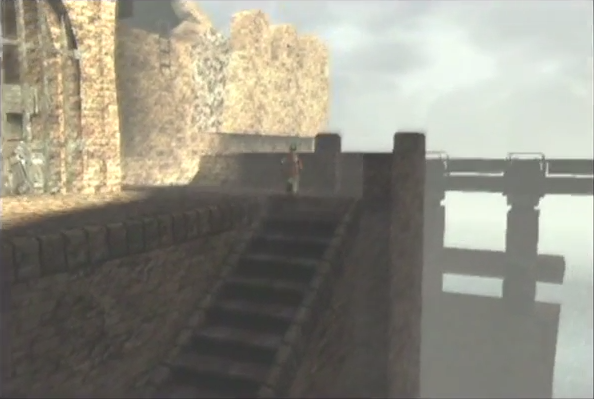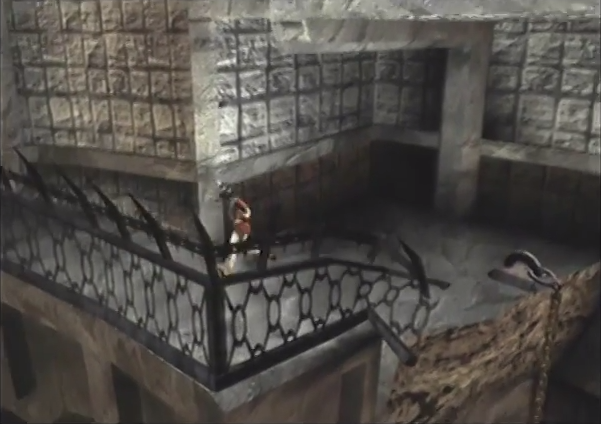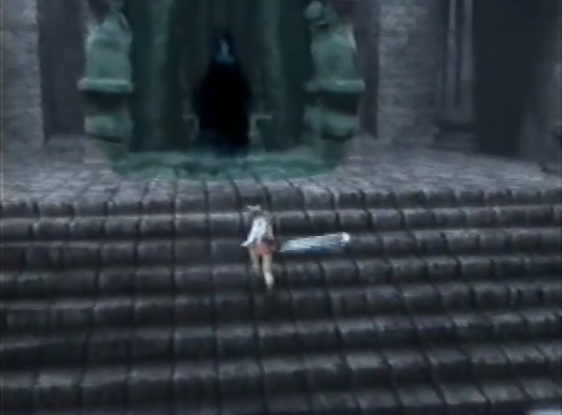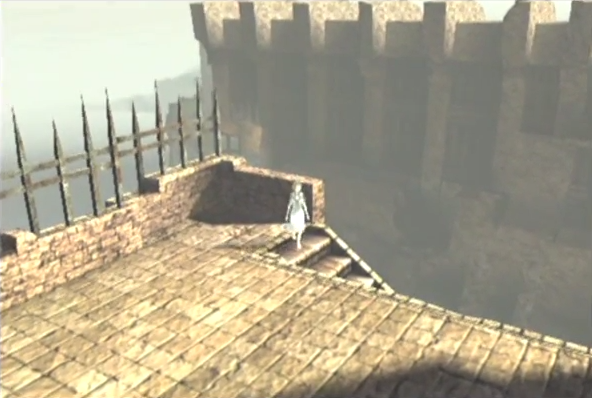ICO (PS2)
More often than not, gamers forget that video-games are essentially a form of art. They’re an interactive canvas where a developer can express their visions, and we as gamers assess this canvas. However, it’s debatable as to whether these games can be compared to forms such as Art House movies. Can gunning through the Nazi-flag corridors of Wolfenstein be compared to a movie like Eternal Sunshine? Probably not, and a lot of games couldn’t be compared to the brightest forms of art. Until, in 2001, Ico was released, that is. On the surface, this game contains simplistic mechanics and a hollow story, with almost no dialogue to speak of. But, once you go further into the dark castle of Ico, you come to find this to be one of the most emotional, beautiful games ever created.
Ico casts you in the role of the protagonist who holds the same name. He is a boy cursed with horns, and therefore he is exiled from his village because it is considered an omen. Placed into a tomb, Ico manages to break out, and after a brief bit of exploration, stumbles upon Yorda, a young girl similarly imprisoned. It’s clear that both Ico and Yorda need each other to escape the dreaded castle, and it becomes a quest through all of the structure’s labyrinths to find their way out. Ico’s plot, at first, seems hollow. There’s very little dialogue outside of the opening, and very few cutscenes to move the plot forward. However, you begin to gain a strong emotional attachment to both characters for multiple reasons. They’re both isolated from the world, emphasised by the fact there is zero human life in this castle, and even from each other as a huge language barrier blocks communication between them. All Ico and Yorda can do is hold each other’s hand and hope they can escape. It’s all incredibly moving and poignant.
In terms of the game itself, Ico is pretty straightforward. You control the horned protagonist from a third-person perspective, with a mostly-static camera. Progressing in a linear fashion, the idea of Ico is to move through the castle by completing puzzles. These vary from simple crate-shifting puzzles to much larger challenges. Usually a path is blocked, and solving the puzzle opens the path into another area which is blocked. It’s a pretty simplistic structure, though the puzzles become increasingly harder to figure out. There’s also combat interlaced throughout the game, though it boils down to bashing the Square button until all of the shadow creatures are dead. Ico is undoubtedly a mechanically well-made game, with mostly smooth-platforming combined with smart puzzles, despite a couple of awkward moments. Sadly you’ll probably blow through Ico in around 6 or so hours, and though it’s definitely an experience worth going through twice, there isn’t a whole lot of content outside the main game. Length is not of consequence in the grander scheme of things, however.
Two things shake up Ico considerably, the first of which is the presence of Yorda. Once freed from captivity, you must guide her through this castle from start to end, and because most of her abilities are limited outside of opening special doors, most of the puzzles require you transport both you and Yorda through each room. You also will help Yorda jump across gaps by catching her when she jumps, create bridges and paths for her to cross and pull her up onto ledges that are too tall for her to scale. Even combat is affected by Yorda, as a sense of panic is created as she is grabbed and dragged into dark portals, where the friendship created is at risk of becoming non-existent. The relationship between the two, even though they cannot verbally communicate, is heart-warming. Ico will tug her along as you move while holding Yorda’s hand, she’ll scurry as you drag her up from a ledge and as you’re using the save points known as couches, both will fall asleep with their heads tucked on each other’s shoulders.
Two things shake up Ico considerably, the first of which is the presence of Yorda. Once freed from captivity, you must guide her through this castle from start to end, and because most of her abilities are limited outside of opening special doors, most of the puzzles require you transport both you and Yorda through each room. You also will help Yorda jump across gaps by catching her when she jumps, create bridges and paths for her to cross and pull her up onto ledges that are too tall for her to scale. Even combat is affected by Yorda, as a sense of panic is created as she is grabbed and dragged into dark portals, where the friendship created is at risk of becoming non-existent. The relationship between the two, even though they cannot verbally communicate, is heart-warming. Ico will tug her along as you move while holding Yorda’s hand, she’ll scurry as you drag her up from a ledge and as you’re using the save points known as couches, both will fall asleep with their heads tucked on each other’s shoulders.
Much of what makes Ico not only a piece of art, but also successful as a game, is the incredible world it creates. Most of the environment is not only gorgeously rendered, but also escapes superficiality. Ico must utilise environmental features such as the edge of balconies seamlessly integrated into the game world, which feels incredibly immersive compared to most phony environments. The effects used, such as beautiful lighting which will blind you at one moment yet be completely pitch-black the next, the soft haze which gives the game a sense of ominous isolation from the outside world and the realistic shadowing ensure Ico is one of the most technically accomplished games of its era. The audio is actually quite sparse, but very effective. The very few instances of dialogue are left in their native Japanese, meaning no awkward English voiceovers intrude. The music, though infrequent, is some of the best to grace any video game, and the subtle sound effects such as the whistling wind in the background create an eerie atmosphere that will send chills down your spine.
Haunting, emotional, beautiful – those are just three of the words with which you could describe Ico. It appears simplistic on the surface, and if you dismiss Ico it will appear that way: just a simple platformer where you have to hand-hold some girl around with you. However, as you approach the first hour of gameplay, you come to realise Ico is more than a game. It’s an artistic experience, with two mesmerising characters trapped in a place isolated from any human life around them. Even if you strip away the feats of its presentation, you can’t deny Ico is a well-made game with smooth platforming and great puzzles. Those seeking something more conventional probably will find Ico out of their comfort zone, but anyone looking for something different, exciting and emotionally powerful, Ico is a game you’ll never forget.
Haunting, emotional, beautiful – those are just three of the words with which you could describe Ico. It appears simplistic on the surface, and if you dismiss Ico it will appear that way: just a simple platformer where you have to hand-hold some girl around with you. However, as you approach the first hour of gameplay, you come to realise Ico is more than a game. It’s an artistic experience, with two mesmerising characters trapped in a place isolated from any human life around them. Even if you strip away the feats of its presentation, you can’t deny Ico is a well-made game with smooth platforming and great puzzles. Those seeking something more conventional probably will find Ico out of their comfort zone, but anyone looking for something different, exciting and emotionally powerful, Ico is a game you’ll never forget.
|
VERDICT
Visual: 10/10
Audio: 9/10 Gameplay: 9/10 Longevity: 7/10 OVERALL: 9/10 |
